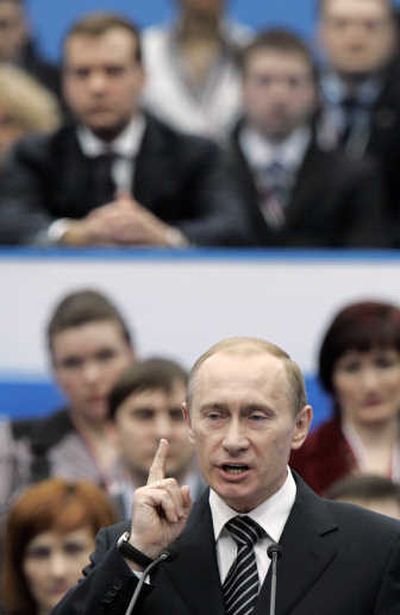Putin named leader of political party

MOSCOW – President Vladimir V. Putin was elected head of Russia’s main political party on Tuesday, moving to shore up his continued power after he leaves office next month.
As head of the United Russia party, Putin will hold sway over parliament through the party’s controlling majority. That means the former KGB officer and popular political leader, who is also expected to be appointed prime minister, will be able to engineer constitutional amendments or begin impeachment proceedings.
The move also could set the stage for Putin’s return to the Kremlin in the 2012 presidential elections, analysts said.
Putin’s appointment as party chief feeds the impression that, while he might bow to his constitutional duty to step down as president, he has no intention of relinquishing the power he has consolidated. Putin will take up his new posts just as his handpicked successor, Dmitry Medvedev, moves into the Kremlin as the new president.
Tuesday’s announcement was carried out with pageantry reminiscent of Soviet-era power plays, as hundreds of delegates raised cards in unison to vote unanimously for their new party boss.
“I accept the offer of the party and its leaders with gratitude,” Putin told the assembly, which burst into a standing ovation. Putin interrupted, almost shouting to finish his acceptance speech. And then, amid swelling applause, Putin and Medvedev shook hands.
“Today, even more than before, we need the consolidation of political forces and the spiritual unity of our people,” Putin said. “We need responsible authorities, working efficiently and in coordinated effort on all levels, and acting as a unified organism.”
Putin and Medvedev presented the outgoing president’s new job as a guarantee of stability. But critics said that it was merely another step in the authoritarianism that has been creeping over Russia since Putin became president in 1999.
The party congress drew inevitable comparisons to the old Communist Party meetings – and many analysts pointed out that, in Soviet days, the party chief could reign as a de facto dictator.
“The country is being thrown further back into the past,” said Sergei Mitrokhin, deputy leader of the opposition Yabloko Party. “The old Soviet-type one-party system will quickly lead us into a new stagnation period.”
Putin and Medvedev have taken pains to present themselves as a solid team that would rule Russia cooperatively. But observers have been skeptical of this arrangement, pointing out that Putin was unlikely to sit quietly in the less powerful of the two posts while Medvedev roamed the world as head of state.